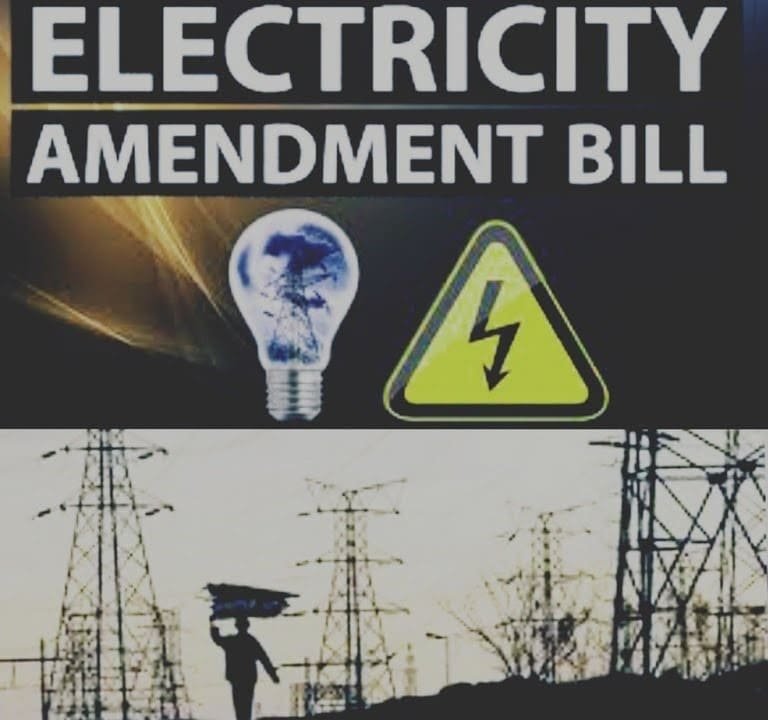
ALL INDIA POWER ENGINEERS FEDERATION
Press Note, 11 July 2022
The draft Electricity (Amendment) Bill 2022 should not be put in the monsoon session of Parliament in haste without talking to electricity consumers and electricity workers, AIPEF sent a letter to the Union Power Minister;
Appeal to Chief Ministers of all states for intervention to stop the Bill;
Decision of nationwide movement in the meeting to be held in Delhi on July 20.
The All India Power Engineers Federation has sent a letter to the Union Power Minister, Shri RK Singh, demanding that the recently released Electricity (Amendment) Bill, 2022 should not be introduced in monsoon session of Parliament in haste and should be discussed in detail with all the stakeholders, especially the electricity consumers and electricity workers.
The All India Power Engineers Federation has also sent a letter to the Chief Ministers of all the States and Union Territories, urging them to take effective intervention to stop this Amendment Bill of far-reaching consequences, so that without taking the opinion of all the stakeholders on the Bill, it is not placed in the Parliament in haste. A meeting of the National Coordination Committee of Electricity Employees and Engineers (NCCOEEE) has been called in Delhi on July 20, in which the decision of the nationwide movement against this bill will be taken.
Shailendra Dubey, Chairman, All India Power Engineers Federation (AIPEF) has written in a letter sent to Union Power Minister Shri R K Singh today that the draft Electricity (Amendment) Bill, 2022, issued a few days ago, is incomplete and insufficient to amend the Electricity Act 2003. He wrote that this Amendment Bill has not yet been placed on the website of the Ministry of Power, this does not contain the Statement of Objects & reasons to amend the Electricity Act 2003 and neither comments have been sought nor any time has been given for comments from the stakeholders.
He has further written that when the Electricity Act 2003 was enacted, the Electricity Bill 2001 was sent to the Standing Committee on Power Affairs of the Parliament and long talks were held for two years with all the stakeholders. Now if any amendment is required in the Electricity Act 2003, then the same method should be adopted which was adopted at the time of making the Electricity Act 2003. There should be complete transparency, comments should be sought from all, discussions should be held with all and it should not be passed in haste by placing in Parliament on just a few days’ notice as this amendment has far-reaching effects on electricity consumers and electricity workers.
He further said that as far as giving choice of power supply to the consumers is concerned, this is a complete hoax. In fact, this bill will give a choice not to the consumers but to the private electricity supplying companies. There is a provision in the bill that only the Government company will have universal power supply obligation that means only Govt Discom will provide electricity to all categories of consumers. Naturally, private companies will give electricity only to profitable industrial and commercial consumers, and Government distribution companies will go into further losses due to providing electricity to farmers and common consumers at below cost and thus Govt Discoms by default will become loss making companies.
According to this bill, private companies will use the network of Government discoms, the expenditure of its operation and maintenance and capacity addition also be borne by the Government discoms. He said Government discoms have already spent billions of trillions of rupees in making this network and thousands of crores of rupees are being spent by Government discoms on its maintenance. Allowing private companies to use this network by charging only wheeling charges is totally unjust and it is a draft of privatization of entire power distribution which will be strongly opposed by the power workers.
He said that this experiment is already underway in Mumbai where Adani Power and Tata Power supply electricity in the same area. Tata Power uses Adani Power’s network. This has led to various legal disputes and the consumers have not got any relief from this. Domestic consumers electricity tariff in Mumbai ranges from ₹ 12 to ₹ 14 per unit which is the highest in the country. Now imposing this experiment on the whole country is a fraud with the common consumers.
He further said that when private companies supply electricity using the network of Government discoms, then billions of rupees will be spent on the energy accounting software to be made for this. This was used in the UK, where such software cost £850 billion 10 years ago, and this cost was collected from consumers by putting them in their bills. The Central Government should clarify that if this experiment is done in India, this expenditure of billions of rupees will be passed on to the common consumers and private companies will earn huge profits, then what will be the benefit of the common consumers. This has also become important because the burden of imported coal has now been passed on to the DISCOMs which will ultimately be recovered from the common consumers.
Shailendra Dubey
Chairman
9415006225
